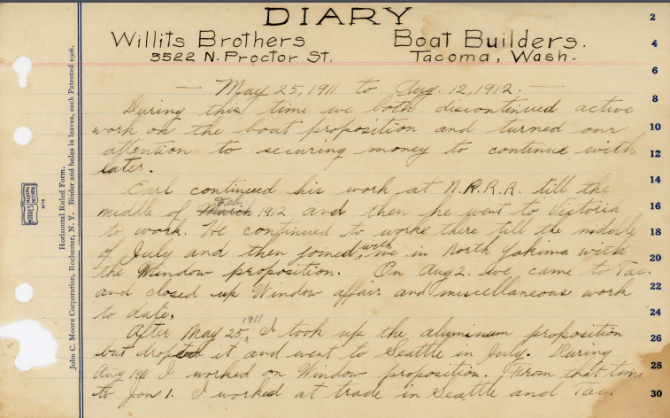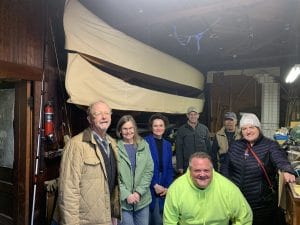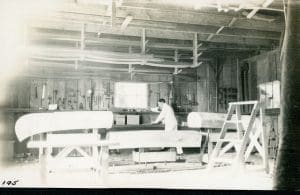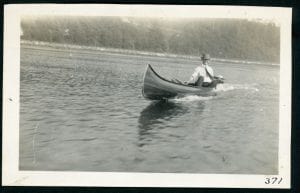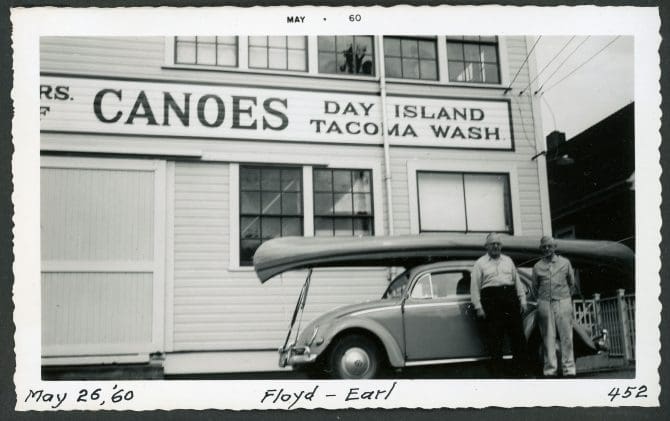In 1908, brothers Earl and Floyd Willits began constructing canoes with a unique “double planked” design. These canoes, which were constructed until the mid-1960s in Pierce County, have became highly prized by canoe collectors and enthusiasts.
In April of this year, Northwest Room staff joined the Willits family at the Willits Brothers Canoe factory on Day Island. With the help of local historian Michael Sullivan, canoe expert and author Patrick Chapman, City of Tacoma Historic Preservation Coordinator Susan Johnson, and donors Kendal and Cindy (Bejarano) Willits, boxes filled with photographs, documents, plans, and other materials related to the operations of the business and the Willits family were transferred to the Northwest Room.
Patrick Chapman, who operates McFarland Lake Canoe Company, is the author of the book The Willits Brothers and Their Canoes: Wooden Boat Craftsmen in Washington State, 1908-1967, opens a new window. Chapman and his wife Leni Oman generously volunteered their time and expertise to fully arrange and describe the business records with the help of local historian Michael Sullivan and Northwest Room staff. Patrick’s unique knowledge of the Willits and their canoe construction process allowed him to provide valuable context and detailed descriptions of the materials.
Northwest Room staff digitized some of the most unique and information rich resources from the collection including the Willits’ diaries from 1910-1911, opens a new window and 1911-1914, opens a new window. Here, the Willits recorded their daily canoe building activities beginning when they were still high school students. Photos of the brothers, their family, and canoe construction, opens a new window have also been digitized and are now available.
According to Chapman, "The Willits Brothers Canoe Company (which the brothers incorporated as Willits Brothers, Inc. in 1926 and then reverted to the original unincorporated business name in 1937 after the state dissolved the corporation for non-payment of incorporation fees) produced a single model of a 17-foot double-planked canoe. The canoes built by the brothers evolved over time, and with the final model appearing in 1930. After a few years of experimenting with Spanish cedar planking and oak and teak trim, the brothers settled on the standard materials of red cedar planking, mahogany gunnels, thwarts, and decks, white oak stems, and mahogany or spruce seats in their canoes. Most of the 918 canoes made by Willits Brothers Canoe Company were for paddling, although the company offered accessories to allow them to be sailed, rowed, or propelled by outboard motor. Also manufactured were spruce paddles, carrying thwarts, cartop carrier blocks and straps, wooden slat or upholstered seat backs, floor carpeting, copper air tanks, and canvas spray and storage covers. Repair of damaged Willits Brothers canoes and sale of repair parts also was a service offered by the company. The bulk of sales of Willits canoes were in Washington state to boys’ and girls’ camps, rental liveries, the Red Cross, and private individuals, although a significant market developed throughout the United States. Marketing was almost exclusively via word-of-mouth, since no records exist of advertisements being placed by the brothers in boating periodicals or newspapers."
"Except for periods during each World War, the company operated continuously from its founding until Earl Willits’ death in 1967. During World War I, production ceased while Earl served in the 137th Aero Squadron in England and France, and Floyd served in the 166th Depot Brigade at Camp Lewis, Washington. The brothers mustered out after the war, Earl as a Sergeant First Class and Floyd as a Second Lieutenant. The brothers were too old to serve in the military during World War II, but restrictions on the materials needed for manufacture of their canoes prevented them from continuing production for a time, even though demand remained strong. While the business was shut down, Earl worked as an automotive instructor at the Mount Rainier Ordnance Depot, and Floyd was on the payroll of the Day Island Club, which served the residents of the Day Island community."
Explore the Willits Brothers Canoe Company Records, opens a new window in Northwest ORCA, opens a new window! For more information, contact the Northwest Room at nwr@tacomalibrary.org or 253-280-2814.

